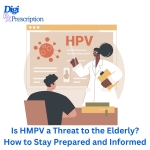
Is HMPV a Threat to the Elderly? How to Stay Prepared and Informed
As the world becomes increasingly aware of respiratory illnesses, the Human Metapneumovirus (HMPV) has emerged as a virus of concern, particularly for vulnerable populations like the elderly. HMPV, which shares similarities with RSV and influenza, can lead to severe respiratory complications in older adults due to their weakened immune systems. This blog explores the risks HMPV poses to the elderly and provides actionable steps to stay prepared and informed.
What is HMPV?
Human Metapneumovirus (HMPV) is a respiratory virus that primarily affects the upper and lower respiratory tract. It was first identified in 2001 and is a leading cause of respiratory infections, especially during the colder months. Symptoms of HMPV can range from mild cold-like symptoms to severe complications such as bronchitis or pneumonia, particularly in high-risk groups.
Why Are the Elderly at Risk?
-
Age-Related Immune Decline:
As people age, their immune systems weaken, making it harder to fight off infections like HMPV. -
Chronic Health Conditions:
Many older adults have underlying health conditions such as heart disease, diabetes, or chronic obstructive pulmonary disease (COPD), which can exacerbate the severity of respiratory infections. -
Increased Vulnerability to Complications:
HMPV can lead to serious complications like pneumonia, respiratory failure, or secondary bacterial infections in elderly individuals.
Symptoms of HMPV in the Elderly
- Persistent cough
- Shortness of breath or wheezing
- Fatigue and weakness
- Fever and chills
- Nasal congestion or runny nose
- Chest tightness or pain
In severe cases, HMPV may require hospitalization for oxygen therapy or ventilator support.
How to Stay Prepared and Informed
1. Strengthen Immune Defenses
- Vaccination: While there is currently no vaccine for HMPV, ensuring up-to-date vaccinations for influenza, RSV, COVID-19, and pneumococcal diseases can reduce the risk of complications.
- Healthy Lifestyle: Encourage regular exercise, a balanced diet rich in fruits and vegetables, and adequate hydration to support the immune system.
2. Practice Good Hygiene
- Wash hands frequently with soap and water for at least 20 seconds.
- Avoid touching the face, especially the mouth, nose, and eyes.
- Disinfect high-touch surfaces, such as doorknobs and light switches, regularly.
3. Limit Exposure to Respiratory Viruses
- Avoid crowded places during flu and virus seasons.
- Wear a mask in high-risk environments, such as hospitals or public transport.
- Encourage family members and caregivers to stay home if they are feeling unwell.
4. Leverage Telemedicine for Early Diagnosis
Telemedicine platforms allow elderly patients to consult with doctors online, minimizing exposure to crowded healthcare facilities while receiving timely medical advice.
5. Monitor Symptoms and Seek Medical Help Early
If an elderly person develops symptoms of HMPV or any respiratory illness, it is important to monitor their condition closely. Seek medical attention if symptoms worsen or include:
- Difficulty breathing
- High fever that doesn’t subside
- Chest pain
- Confusion or lethargy
Future Prospects: Vaccines and Research
Scientists are actively researching vaccines and treatments for HMPV. Advances in mRNA technology, which proved successful in COVID-19 vaccines, hold promise for future immunization against HMPV. Until then, prevention and early intervention remain the best defenses.
Conclusion
HMPV poses a significant threat to elderly individuals due to their increased vulnerability to severe respiratory infections. By staying informed, practicing good hygiene, and taking proactive steps to boost immunity, older adults and their caregivers can reduce the risks associated with HMPV. While researchers work towards developing a vaccine, prevention remains the most effective strategy to protect this high-risk population.
